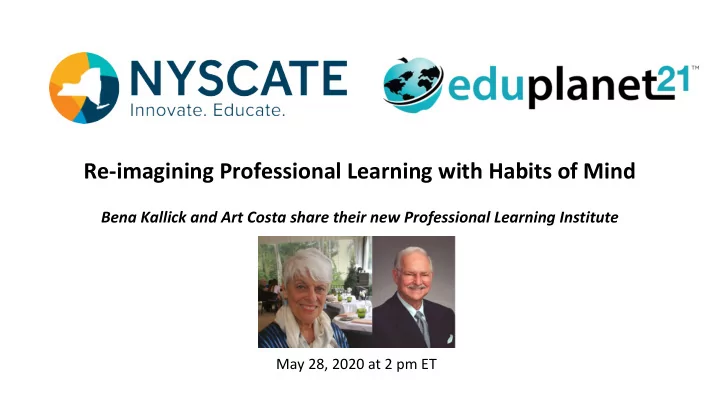

Re-imagining Professional Learning with Habits of Mind Bena Kallick and Art Costa share their new Professional Learning Institute May 28, 2020 at 2 pm ET
What We Do A Powerful Curriculum Management Platform How We Do It Integrated Professional Learning and Unit Design
Our Curriculum Management Platform CURRICULUM DESIGN Guided Unit Planning ● The core of what we do ● Easily create and share curriculum units ● Analyze alignment and frequency ● Based on Understanding by Design PROFESSIONAL LEARNING INSTITUTES PLUS Institutes, Institute Builder Enhanced Build Professional Learning Institutes ● Student Learning Collaborate on topic-centered course ● content, discussions, and resources
Introducing Bena Kallick and Art Costa
VUCA Volatile Uncertain Ambiguous Complex 5
Dispositions of what intelligent people do when they are confronted with problems, the resolutions to which are not immediately apparent. — Costa and Kallick (2008) Dispositions for a VUCA world 6
7
Carolina from Brazil Kids imagine the future in 2030 • https://twitter.com/carolursulino/status/1261315094488723464?s=2 0
WHY HABITS OF MIND? They describe actionable patterns of capacities and behaviors that can be learned and assessed Transdisciplinary/Transfer As good for adults as they are for students Focused on long range, (21 st Century) enduring, essential learnings
Mind Shift To: Knowing how to behave when From: Knowing right answers. answers are not immediately apparent. Implications for Teaching: How might we develop ways to include Habits of Mind into our curriculum and instructional designs? 10
Mind Shift To: Learning which From: Learning engages social, compartmentalized into emotional, and cognitive content and skills. dimensions Implications for Teaching: How might we develop ways to include these dimensions into our curriculum and instructional designs? 11
Mind Shift From: Assuming To: Realizing parents are only a part From: Knowing right that parents are of the reporting answers. partners in structures learning Implications for teaching: How does this affect the ways we communicate with and include parents & caregivers in their children’s learning? 12
Mind Shift To: Learning is motivated From: Thinking that grading and testing are ways to from within–through their motivate learning curiosity and wonderment Implications for Teaching: How do we personalize learning and help students to discover their interests, talents, and strengths? 13
New Habits of Mind Institute Sneak Peek
New Habits of Mind Institute Software Demo
Recommend
More recommend